From The CRPG Addict
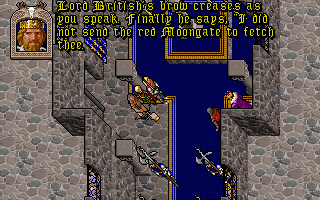 |
| This is taken out of context, but it amuses me to pretend it happened right after I said. “Hello, Lord British! It’s good to see you again!” |
I thought I remembered that The Black Gate’s plot leads you around Britannia on a leash, and for the purposes of my second session, I was willing to follow. For role-playing reasons alone, I wanted to see Lord British as soon as possible and get his take on recent events. All the clues from the murder in Trinsic also pointed in that direction, including the fact that there was a similar murder there a few years ago and that the Trinsic murderers–a gargoyle and a man with a hook for a hand–had likely escaped on The Crown Jewel, bound for Britain.
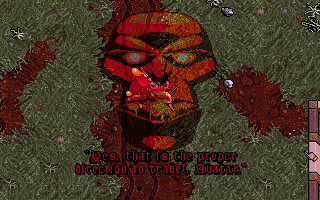 |
| It’s a little unnerving that the Guardian approves of my choice of route. |
A few years ago, I tried to calculate the “real world” size of
Ultima IV. I came up with figures ranging from 4 square miles (if you go with 10 feet per square, which made sense in relation to houses and furniture) to around 75 square miles (if you go by in-game travel time) to 144 square miles (if you go by the practical average size of landscape features). Even at its most generous, Britannia is the size of a large town or a small county. That is (somewhat disappointingly) felt more keenly in this game, where the developers significantly expanded the ground size of the cities but not the size of the world. The Serpent Mountains are now basically the rear wall of Lord British’s castle, with no open plain between the two. Paws is a twist in the road up from Trinsic, and Britain continues immediately from Paws. All of this to say is that “a ship bound from Trinsic to Britain” is more than a little silly since the entirety of the ocean is about the size of a municipal reservoir, and the distance from the dock of Trinsic to the dock at Britain is maybe a dozen boat lengths. You could walk it before the ship’s crew had a chance to finish hoisting the sails.
As I said, the village of Paws is a twist in the road north of Trinsic, and there’s something at that twist in the road: a theater where three characters named Paul, Meryl, and Dustin perform a “passion play” about the Fellowship. We paid to see it. I was a bunch of melodramatic nonsense about how a man loses his wife but rises out of his despair through the inner strength he finds through the Fellowship. He pledges half his wealth to the Fellowship and somehow receives a bundle of gold in return, at which point he declares:
The voice came to me in a dream
‘Twas mine ‘inner’ voice so fair
I now have a companion and provider
And a master about whom I care.
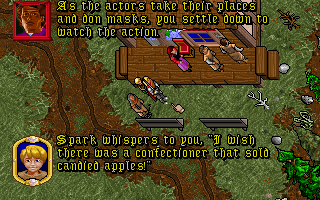 |
| Are you fourteen or four? |
If you’d been paying attention, you’d note that the terms “companion,” “provider,” and “master” are what the Guardian calls himself during the game’s introduction, but in case you weren’t paying attention, the game calls attention to it for you:
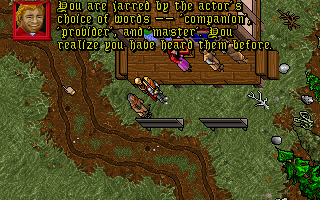 |
| Why not just provide a flashback while you’re at it? |
So only a few hours into the game, not only is it clear that the Fellowship is rotten, but that there’s some connection between them and the Guardian whose face keeps taunting you. Maybe that’s okay, but I’m not sure that for storytelling reasons it was a good idea to show that many cards that quickly.
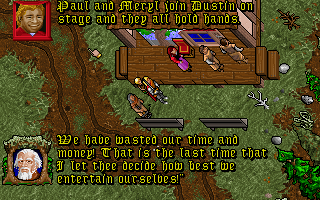 |
| It’s called “intelligence-gathering,” Iolo. Look it up. |
If the Fellowship’s basic corruption isn’t already obvious to the player, it becomes more so in Paws, where the organization runs a homeless shelter but only lets you stay there if you join. A couple of proud beggars panhandle in the north of town and refuse to join the Fellowship, speaking contemptuously of a fellow beggar who did the opposite and now recruits for them. One of the beggars is on crutches and the other has no legs below the knees
 |
| I guess magical healing doesn’t restore limbs. |
(The beggar on crutches is either a peeping tom or the programmers didn’t bother to restrict the opening-the-shutters-on-a-sunny-day animation to NPCs who actually own the structure in question.)
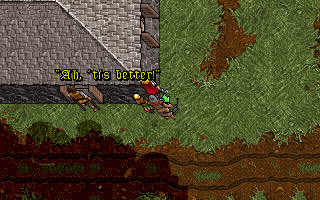 |
| Pervert. |
The shelter is run by a married couple, Feridwyn and Brita. They’re skeptical that I’m the Avatar. Other than Merrick, the beggar, there’s a widow named Alina staying there with her baby. Her husband, Weston, has recently been jailed in Britain for “stealing fruit from the Royal Orchards”–based on the testimony of a Fellowship member. She’s hung up on the irony of being forced to join the organization that ratted on her husband, but I’m wondering how stealing fruit from the Royal Orchards could possibly be a crime, let alone one that carries a prison sentence. One more thing to talk to Lord British about.
Back in Trinsic, I had found some scroll from the “Britannian Purity League” demanding that someone “Keep Britannia clean — send the gargoyles back!” I had suspected that there might be a connection with the Fellowship. Feridwyn and Brita had the same scroll prominently on a table in the shelter, right next to the Book of the Fellowship. I guess that removes all doubt. It’s just weird to see an organization striving for legitimacy so open about their racism.
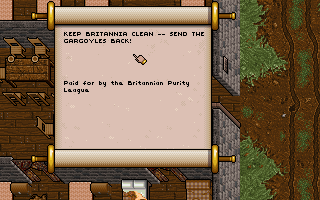 |
| Send them back where? Isn’t the other side of the world gone? |
Feridwyn and Brita have a son named Garritt. They insist he’s a master of the pan pipes and will one day study at the conservatory in Britain. The only other child in town is a boy named Tobias whose mother, Camile, runs a farm. The two don’t like each other but are forced to hang out sometimes because of their age. Tobias hates the Fellowship. Feridwyn and Brita judge Camile for being a single mother. They hope that the behavior of their perfect son rubs off on Tobias.
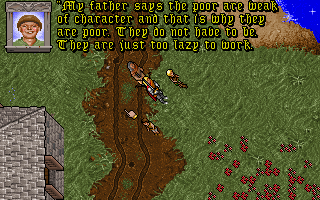 |
| The social commentary in this game is 30 years old but, depressingly, not out-of-date. |
Camile was delighted when she saw me in the inn. She somehow recognized me immediately.
 |
| How?! |
The source of her delight soon became apparent:
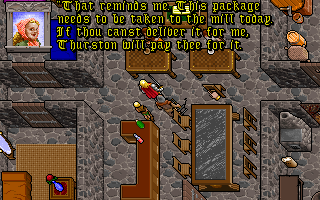 |
| If George Washington ever steps out of a portal in my yard, I’m going to ask if he wouldn’t mind cutting down some trees before he moves on. |
In 200 years, the legend of the Man from Another World who shows up to Do Menial Errands and Solve Small Problems has clearly grown strong.
Meanwhile, the butcher, Morfin, is reporting that someone has recently stolen a quantity of serpent venom from him–serpent venom being an extract from silver serpents, a creature that has only appeared in one previous Ultima game, Exodus, where it was unique. According to Morfin, serpent venom causes increases in strength, endurance, and euphoria, skin necrosis after repetitive use, and fatality at high doses. The government is close to regulating sales of it. Morfin coyly reports that he “keeps a small stock” of it and occasionally sells it to “the apothecary in Britannia.” (I assume he means “Britain.”) The owner of the abattoir, Andrew, tells me that Morfin hides a key in his shop. I spend some time moving things around before I find it under a plant. It opens not the locked door in his shop but a chest in his home, where I find some gold but refuse to take it.
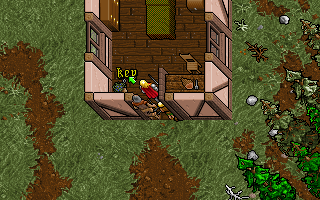 |
| I identify a key under a plant. |
But I do find a key in his house that opens the door in his shop. It opens a door to a small room with an unlocked chest. Here, I find several vials of silver serpent venom, five gold bars (indicating he’s been making a lot from his side-business), and a ledger showing dozens of sales over the last year–clearly not just a “small supply” going to some apothecary. When I confront him with the ledger, he confesses that he sells the venom to the Britannian Mining Company, which uses it to make gargoyles work longer hours.
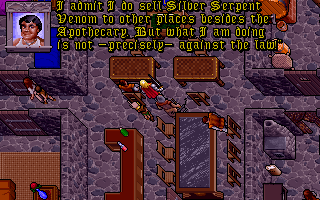 |
| Pro-tip: Any time you argue that what you’re doing isn’t “technically” against the law, you’ve already lost the argument. |
Anyway, you’ve probably already solved the mystery from what I’ve told you. Feridwyn and Brita are quick to blame Tobias–a blame that grows stronger when a vial of venom is found among Tobias’s things. But Tobias says that Garritt was hanging around his place, supposedly “looking for a ball,” and indeed I soon find a vial of venom among Garrit’s belongings. Moreover, Garritt soon displays symptoms of using the venom. This revelation causes Feridwyn and Brita to realize their own arrogance and selfishness and to re-dedicate their lives to . . . Sorry, I can’t even finish.
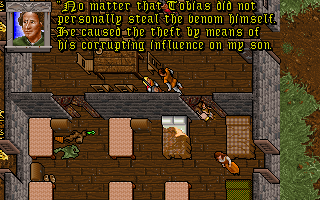
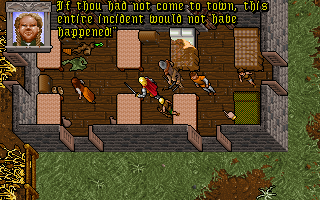
Paws has a few other things going on. The register at the only inn in town, the Salty Dog, shows that someone calling himself “The Avatar” has been there recently, as has Dupre. I buy some bread there for my party members’ bottomless maws. The innkeeper, Polly, is the object of affection of the miller, Thurston, and I get the two crazy kids together after a couple of dialogue back-and-forths. Both refuse to join the Fellowship for their own reasons, which is as close to anything as a virtue test in this game.
 |
| The miller confesses his unrequited love to a complete stranger. |
There’s an antique dealer in town who sells a sextant for 20 gold pieces, a lot less than the guy in Trinsic wanted. When you use the sextant, it tells you your coordinates. But when you use the map while in possession of a sextant, it shows your position in the game world.
 |
| If only this could be called up with a single keypress. |
I realized with a start that I’d lingered in Paws too long. An obviously-evil organization with a connection to an extra-dimensional demon is gaining power; the gargoyles, whose home we accidentally destroyed, are being exploited and denigrated; there’s a booming drug trade; a serial murderer is at work; we just had an ominous earthquake; people are being jailed for stealing fruit; maimed farmers are begging in the streets; and someone said she’s not even sure that the shrines are around anymore. Surely, Lord British must have something to say about all of this. It was time to head to the castle and get an explanation.
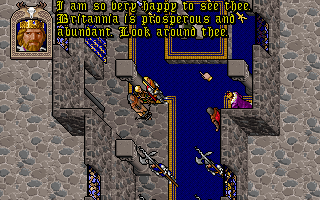 |
| Face-palm. |
Okay, I’m guilty of a little selective screenshotting here. In truth, Lord British seems to realize–
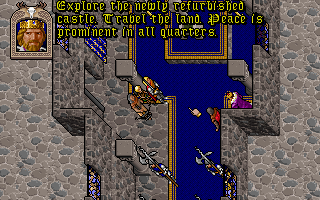 |
| You’re not helping. |
No, seriously. When pressed a little bit, Lord British admits that–
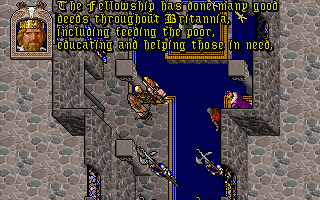 |
| I think I’d advise you to take the Fifth from now on. |
I really am somewhat kidding but, as we’ll soon see, not entirely. The way Lord British is written in both VI and VII is curious. The character has never had a lot of depth, but for many games that was largely due to a sparseness of dialogue inherent in the limitations of the game engines. Here, as in Ultima VI, he has a lot of dialogue, just hardly any that conveys any of the things that we are repeatedly told about Lord British in the game materials. He shows little wisdom, little nobility. He seems bored, unengaged, uninterested. And of course he’s just wrong about many things, including the Fellowship and its founder:
 |
| Really?! |
It’s not like Batlin has been particularly crafty, either. Lord British just isn’t paying attention. Now I’m all for having complex NPCs with flaws, and perhaps it is time to introduce some complexity into the tired trope that TVTropes calls “The Good King.” It just still seems a bit weird that the owner of the company allowed his avatar to be treated this particular way. I’m trying to imagine the meeting at which this dialogue played out:
Developers: “We think Lord British needs some flaws to balance out his wisdom and nobility.”
Garriott (thinks for a moment): “Make him well-meaning but wrong about everything.”
Developers (nodding): “That’s good.”
Garriott (catching a glimpse of one of the custodians bending over to empty the trash): “Also, maybe he’s boning the domestic help?”
Developers: “Ooh, even better.”
Garriott: “Also, make sure you really put the screws to Electronic Arts again. It’s not like we’re about to sell them the company.”
Everyone: [roars laughter]
I’ll cover my full dialogue with Lord British (as well as his nighttime proclivities) next time. For now, a few notes about the small things that the developers programmed into the game:
- Double-clicking on a sundial gives you the current time.
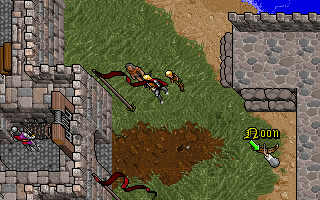 |
| Not very precise, but still . . . |
- Clouds pass overhead and temporarily darken what you can see on the ground.
- You have to be careful walking through or near swamps. The very second your character strays into the swampy terrain, he gets poisoned and glows green. I assume swamp boots prevent this condition.
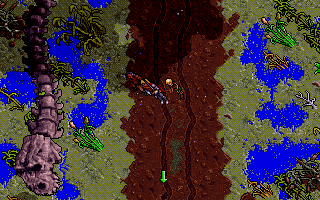 |
| A cloud passes overhead, rain falls, the swamp burbles. |
- If you double-click on a chair, the Avatar sits there while the entire party tries to find seating nearby. Sometimes it produces comical arrangements.
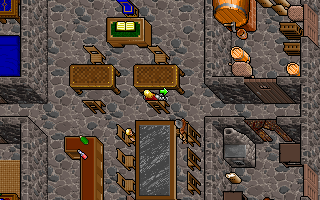 |
| Wow, they are really mad that I made them watch that play. |
- Double-clicking on a cow causes all the party members to yell, “Moo!” at it. This reminds me of how every time we drive by a field of cows, I’m compelled to roll down the window and yell “Moo!”
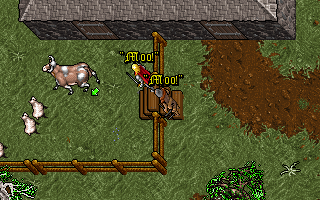 |
| Irene, meanwhile, is compelled to say, “Chet, can we please not this one ti—“ |
- According to the ledger in Morfin’s shop, the current Britannian year is 360. I can’t remember if specific numbered years have ever come up before. I assume the numbering is from the re-creation of Sosaria into Britannia between Ultima III and IV.
- The members of the Fellowship all use the exact same words to describe the organization and its philosophy. At first, I thought this was lazy re-use of dialogue, but now I’m thinking that it’s deliberately meant to suggest that they’re just parroting what they’ve been told.
It’s not many games that allow you to get 2,500 words out of a couple of hours of walking and dialogue. I’m three entries into The Black Gate, and I’ve still yet to fight a single combat, level up, or do anything that you would expect from an RPG. And yet, the developers have managed to create an intense urgency upon the part of the player to get out there and fix this place. This desire is particularly acute to a repeat visitor–someone who is making the trip to Britannia for the fourth time. I imagine that players who came to the world for the first time in Ultima VII didn’t feel that same angst. They might have enjoyed the game for its plot and mechanics, but lacked the sense that a place they loved was in serious danger.
Well, one thing at a time. Today, the Mystery of the Stolen Venom. Tomorrow, the world.
Time so far: 5 hours
Original URL: http://crpgaddict.blogspot.com/2020/04/the-black-gate-making-britannia-great.html

























